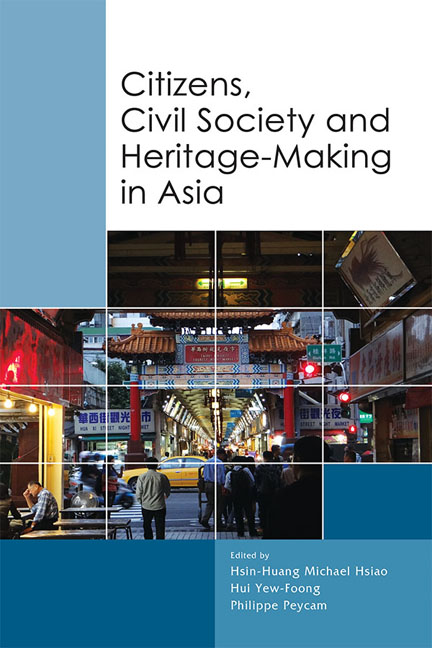Book contents
- Frontmatter
- Contents
- Contributors
- 1 Introduction: Finding the Grain of Heritage Politics
- 2 Heritage, Identity and Power
- 3 Heritage-Making and Post-coloniality in Yangon, Myanmar
- 4 Living Heritage of Ruins? Contesting the Paradox in Trowulan's Majapahit Heritage
- 5 The Reconstruction of Heritage in Rural Vietnam: An Analysis of State and Local Dynamics
- 6 Performing Cultures, Negotiating Identities: The Cultural Politics of Indigenous Cultural Villages in West Malaysia
- 7 Constituting Philippine Filmic and Linguistic Heritage: The Case of Filipino Regional Films
- 8 Encounter and Counter-Narratives of Heritage in Macau
- 9 Cultural Activities of the Chinese Community in Post-war Myanmar
- 10 Chinese Street Opera in Singapore: Heritage or a Vanishing Trade
- 11 Policy Formation and Civil Society Engagement in Heritage-Making in Taiwan: A Historical Examination
- 12 Becoming Taiwanese: Appropriation of Japanese Colonial Sites and Structures in Cultural Heritage-Making — A Case Study on the Wushantou Reservoir and Hatta Yoichi
- 13 Defining Culture in the Heritage Preservation of Taiwanese Veterans’ Villages: The Case of Zuoying
- 14 Tobacco Crop Memories in Taiwan: The Heritage of a Deadly Agriculture
- Index
2 - Heritage, Identity and Power
Published online by Cambridge University Press: 03 January 2018
- Frontmatter
- Contents
- Contributors
- 1 Introduction: Finding the Grain of Heritage Politics
- 2 Heritage, Identity and Power
- 3 Heritage-Making and Post-coloniality in Yangon, Myanmar
- 4 Living Heritage of Ruins? Contesting the Paradox in Trowulan's Majapahit Heritage
- 5 The Reconstruction of Heritage in Rural Vietnam: An Analysis of State and Local Dynamics
- 6 Performing Cultures, Negotiating Identities: The Cultural Politics of Indigenous Cultural Villages in West Malaysia
- 7 Constituting Philippine Filmic and Linguistic Heritage: The Case of Filipino Regional Films
- 8 Encounter and Counter-Narratives of Heritage in Macau
- 9 Cultural Activities of the Chinese Community in Post-war Myanmar
- 10 Chinese Street Opera in Singapore: Heritage or a Vanishing Trade
- 11 Policy Formation and Civil Society Engagement in Heritage-Making in Taiwan: A Historical Examination
- 12 Becoming Taiwanese: Appropriation of Japanese Colonial Sites and Structures in Cultural Heritage-Making — A Case Study on the Wushantou Reservoir and Hatta Yoichi
- 13 Defining Culture in the Heritage Preservation of Taiwanese Veterans’ Villages: The Case of Zuoying
- 14 Tobacco Crop Memories in Taiwan: The Heritage of a Deadly Agriculture
- Index
Summary
My colleague Yujie Zhu recounted a tea ceremony he had attended in Canberra, Australia. At the ceremony was a student from Taiwan, a Chinese mainland tea expert, and a Japanese scholar. The Taiwanese student said, “Every time I drink this, it make me feel like I am back at home. It is like I am in Taiwan. I am feeling Taiwanese.” The Japanese scholar responded, “Yes, I can understand, but you know, this tea was actually influenced from Japan.” The tea expert then said, “Oh, interesting, because the tea is now sold as a Chinese tea.”
What this story tells us is that heritage-making is always fraught and contested. Indeed it is always political, not simply because its interpretation or history may be disputed, but because any assertion of inclusive heritage must also include an implicit assertion of exclusion — “this is who I am, and you are different from me”.
One of the significant assumptions that underpins both heritage management practices and heritage scholarship is that heritage is about identity. Heritage, in either its intangible or tangible form, is intuitively understood to be about the assertion and reinforcement of identity — be that associated with social, cultural, national, ethnic or other forms of identity. The link between heritage and identity is often simply taken for granted, and there is very little work that takes as its central task an analysis of the linkages between expressions of identity and heritage.
In attempting to reveal these links, I want to develop my argument that heritage is a cultural performance, in which the meaning of the past for the present is continually recreated and reinterpreted to address the political and social needs and problems of the present. Contra to the writings of David Lowenthal (1986, 1996) and Benedict Anderson (1991), heritage is neither a cult nor is it imagined or simply invented; rather it is part of a cultural and political performance and set of negotiations that has material consequences for a range of contemporary social problems.
- Type
- Chapter
- Information
- Citizens, Civil Society and Heritage-Making in Asia , pp. 15 - 39Publisher: ISEAS–Yusof Ishak InstitutePrint publication year: 2017



